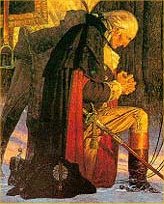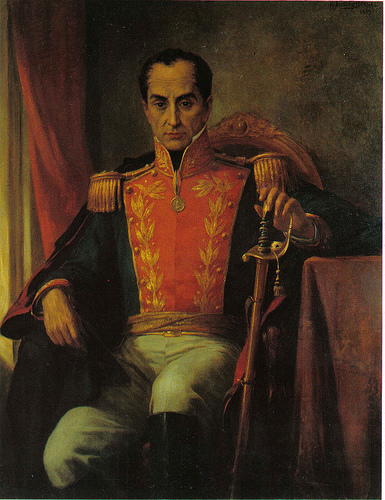The speaker noted that of the 33 revolutions since (and including) the American Revolution, only six of them were led by Freemasons, which would seem to indicate Freemasons are not the dreaded revolutionaries they’re portrayed as. I was amused by his comment that the more revolutionary the Freemasons were believed to be, the more revolutionary they became — because young hotheads looking for revolution naturally went to where they believed it could be found! There’s a case of social expectations creating precisely the effect society didn’t want.
 The speaker also listed the six revolutionary Freemasons, discussing them at some length. They were, in order:
The speaker also listed the six revolutionary Freemasons, discussing them at some length. They were, in order:
- George Washington: known not as a ruthless warrior by his people, but rather as a man of virtue and the father of his new country. He was clearly proud to be a Freemason, since there are many depictions of him in the regalia;
- Louise Phillippe II, Duke of Orleans and cousin to the king: known as a traitor to his family, class, and country for leading the French Revolution. It’s no wonder things got horrifically bloody so fast, considering how hardcore vicious Louise Phillippe (who preferred to be known as Phillippe Egalite) was! The group of citizens trying to govern at that time was mostly extremely reluctant to actually execute the king, holding four votes on it — and every time Phillippe voted for death for his cousin. Further, after the last vote there was a motion to simply table the sentence indefinitely. The vote was 250 for to 251 against. Guess who the tie-breaker was?
- Simón Bolívar: known as the liberator of South America. There was nothing mentioned about how the citizenry saw Bolívar, but they did name a country after him, so he must have been regarded well at least there. Interestingly, it is believed he was a member of a “traveling” Freemason lodge called Lautaro, which was originally based in Cádiz, Spain. It traveled due to governmental oppression, if I understand correctly;
- Giuseppe Garibaldi: known as the unifier of Italy. When his first attempt at revolution in Genoa failed, he fled Italy for South America, helping Bolívar there before he returned to Italy. His training in revolution and Freemasonry (he is believed to be another member of the Lautaro lodge) apparently helped, as the second time around in Italy, his revolution stuck;
- Benito Juárez: known as the liberator of Mexico. This was apparently a terribly confused time in Mexico, with Freemasons on both sides of all the assorted skirmishes and attempts at revolution. Juárez’s mission was for Mexican democracy (although I wasn’t able to write down the actual slogan fast enough), as opposed to the conservative slogan of “Church & Order.” I didn’t catch in my notes why he’s considered a Freemason; I vaguely recall something about him also being a Lautaro member?
- Mustafa Kemal Atatürk: the man who liberated Turkey; abolished the caliphate, and recreated Turkey as a secular, progressive, liberal republic. He was very against the normal Islamic theocratic beliefs. Unfortunately I didn’t get anything in my notes about his relationship with Freemasonry. Curiously, despite warring for democracy, Atatürk ruled Turkey as dictator for 16 years, dying in office. Unusually, Turkey actually remained a republic after his death.
For all that the Freemasons were known as revolutionaries, I find it telling that Franco, Mussolini, and Hitler all distrusted them intensely as hotbeds of undesirable democratic, progressive, and liberal tendencies. However, I also find it telling that (if my limited memory of my high school history classes is not failing me) each of the revolutions listed above got more progressively bloody and lasted ever longer, often dragging the afflicted country into desperate economic straits well past whatever the original leeching effect was of the previous government. At this point I’m only surprised anyone would ever wish to revolt violently, considering the dreadful costs in human lives and blood, fire and rapine, and pointlessly wanton destruction.
I cannot help but also wonder if there was a qualitative difference in the American Revolution, as opposed to the others mentioned. Why was the US the nation to later became the most powerful? Was it because the US of the time had more product to sell in Europe, thus forestalling the usual post-revolution economic collapse? Was it because it was the only one led by what was believed to be a “virtuous man”? Was it because the US did not have a traditional caste system of nobility over serfs or peasants? Was it due to the familial ties with Europe being deliberately cut, thereby curtailing the frustration and anger of South American “half-breed” noble sons returning to their European familial homes — only to discover they would always be considered second-class citizens? I don’t know, but it’s fascinating to speculate.
 Regarding the presentation itself, I was curious to note the graphics choices made by the speaker. The first picture for George Washington, for example, depicted him in prayer; that’s him at the top of this posting. It was easy to believe this man was considered virtuous by his people. The one for Simón Bolívar, however, showed a brooding, shadowed, grim man with a sword in hand. Looking at it during the talk, I was reminded of Shakespeare’s Caesar commenting to a friend, “Yon Cassius hath a lean and hungry look; He thinks too much: such men are dangerous.” Cassius, of course, later organizes Caesar’s assassination.
Regarding the presentation itself, I was curious to note the graphics choices made by the speaker. The first picture for George Washington, for example, depicted him in prayer; that’s him at the top of this posting. It was easy to believe this man was considered virtuous by his people. The one for Simón Bolívar, however, showed a brooding, shadowed, grim man with a sword in hand. Looking at it during the talk, I was reminded of Shakespeare’s Caesar commenting to a friend, “Yon Cassius hath a lean and hungry look; He thinks too much: such men are dangerous.” Cassius, of course, later organizes Caesar’s assassination.
Was it an unconscious choice of graphics? It certainly subtly underlined many of the perplexities I had regarding the qualitative differences between the American Revolution, and all the others. Short of asking the speaker, however, I have no way of knowing for sure.
Sadly, the speaker apparently thought PowerPoint slides should only recapitulate the actual talk. Consequently the audience effectively got to read precisely the same words they were hearing. The author did add a few nice graphics, as I noted here — but having your slides exactly state what you’re going to say anyway is not, in my not so humble opinion, a good idea.
More about the conference as I get it written! :)

